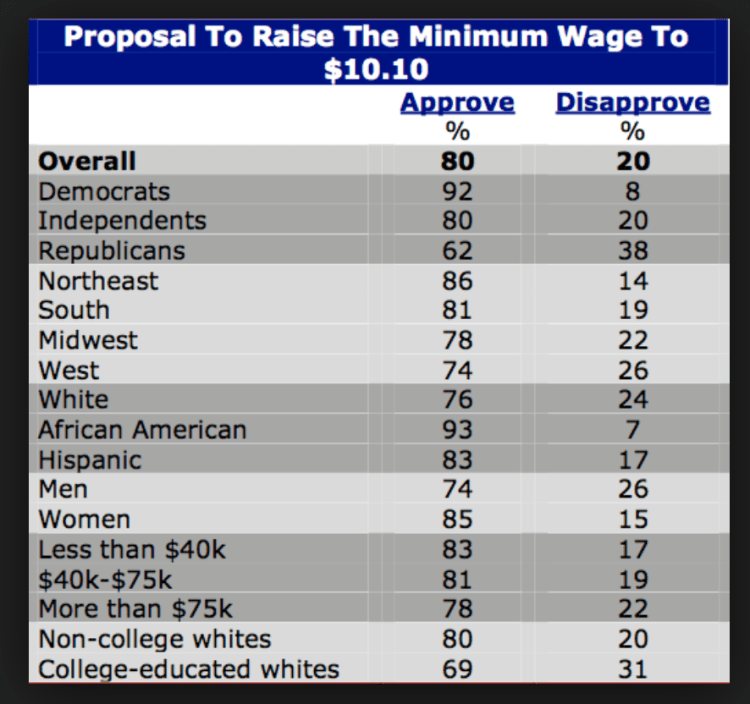During this year’s State of the Union address, President Obama told Congress and the country that in the next few weeks he “will issue an executive order requiring federal contractors to pay their federally-funded employees a fair wage of at least $10.10 an hour.” For years and to no avail, the President has attempted to convince Congress to increase the federal minimum wage.
Many conservatives and libertarians believe that minimum wage laws are fundamentally bad for the economy, or, alternatively, that these laws inherently undermine the “right to contract.” The government, they contend, has no legitimate legal authority to mandate the terms and conditions of a contract between two willing, consenting private-sector parties. Or something like that.
Even if you agree with that premise, however, it is hard to make the case that the government itself should be prohibited from setting or negotiating the terms of its contracts. If you seek a contract from the federal government, you are asking to be compensated for your services by taxpayers. There isn’t a single person or a single company in the world legally obligated to apply for a contract with the federal government; it’s a choice, a business decision. And if you believe that two willing and consenting private-sector parties should be free to negotiate the terms of a contract, then you should also believe that the government should be free to negotiate its terms.
As a matter of public policy, the government has a compelling interest in ensuring taxpayer dollars are not used to enrich companies that refuse to adequately and fairly compensate their employees. It shouldn’t be difficult to comprehend: The less a company pays its employees, the greater the overall burden on the public, the more we are all required to spend on health care, unemployment, Social Security, education, and a whole panoply of social welfare services and programs.
On a fundamental level, we should ask ourselves why, on earth, we would ever spend public, taxpayer money to line the pockets of companies that either do not or will not provide their employees with a decent, living wage. After all, this is not a matter of companies that simply cannot pay employees a living wage. If you are applying for a government contract, the margins may often be tight; occasionally, it may require more work than you anticipated. Again, though, this is a business decision, and business decisions always carry risks. And if the only reason your company had the lowest bid or the winning proposal is because you are paying your employees the absolute minimum, the government should not be required to hand you a contract.
President Obama, in announcing his upcoming executive order, also issued a challenge to other elected officials throughout the country. “To every mayor, governor, state legislator in America, I say, you don’t have to wait for Congress to act; Americans will support you if you take this on,” he said.
I worked for a mayor in Louisiana for several years, and immediately after the President issued his call to action, I wondered whether it was even legally possible for a mayor in Louisiana to take the same type of executive action the President is pursuing. I thought about the Requests for Proposals and Requests for Qualifications that I had authored and edited as a mayoral assistant. On projects that were not subject to public bid law, we had at least a little flexibility. We could encourage diversity; we could reward experience and expertise; we could promote concepts like sustainability and smart growth. But, of course, the Mayor and his staff, usually, are only making recommendations; the City Council has to authorize the Mayor’s ability to actually enter into these contracts.
Either way, it seemed imminently reasonable that Mayors and Councilpersons all over Louisiana and the country could follow President Obama’s example and require that their contractors pay its employees a living wage on projects funded by the public. As it turns out, however, it’s currently illegal for a Mayor and a City Council in Louisiana to require that publicly-funded employees are guaranteed a minimum or a living wage.
And it all traces back to a 1997 law co-authored, among others, by State Representatives David Vitter, Steve Scalise, and Tony Perkins.
The law, effectively, codifies poverty; it prohibits local governments from ensuring that their own locally-generated tax dollars are spent responsibly. Quoting from the text of the law, LSA-R.S. 23:642 (bold mine):
§ 642. Setting minimum wage, prohibited
A. Legislative findings.
(1) The Legislature of Louisiana finds that economic stability and growth are among the most important factors affecting the general welfare of the people of this state and are, therefore, among its own most important responsibilities. Economic stability and growth contribute to the standard of living enjoyed by citizens as employment and income are both dependent on the ability and willingness of businesses to operate in the state.
(2) The legislature further finds that wages comprise the most significant expense of operating a business. It also recognizes that neither potential employees nor business patrons are likely to restrict themselves to employment opportunities or goods and services providers in any particular parish or municipality. Consequently, local variation in legally required minimum wage rates would threaten many businesses with a loss of employees to areas which require a higher minimum wage rate and many other businesses with the loss of patrons to areas which allow for a lower wage rate. The net effect of this situation would be detrimental to the business environment of the state and to the citizens, businesses, and governments of the various local jurisdictions as well as the local labor market.
(3) The legislature concludes from these findings that, in order for a business to remain competitive and yet to attract and retain the highest possible caliber of employees, and thereby to remain sound, an enterprise must work in a uniform environment with respect to minimum wage rates. The net impact of local variation in mandated wages would be economic instability and decline and a decrease in the standard of living for the citizens of the state. Consequently, decisions regarding minimum wage policy must be made by the state so that consistency in the wage market is preserved.
B. Therefore, pursuant to the police powers ultimately reserved to the state by Article VI, Section 9 of the Constitution of Louisiana, no local governmental subdivision shall establish a minimum wage rate which a private employer would be required to pay employees.
Approved June 18, 1997.
Vitter and his colleagues cleverly and wisely attempted to frame this law as if it was about preventing a municipality from superseding state and federal authority and mandating a city-wide minimum or living wage ordinance for everyone. In fairness, they were right to be on notice. Effectively, however, the law still really accomplishes one thing: It prevents communities all over Louisiana from negotiating the terms and conditions of taxpayer-funded contracts.
President Obama can ensure that contracts entered into by the federal government include minimum wage requirements for publicly-paid employees, but because of a law co-authored by David Vitter, Mayor Mitch Landrieu probably can’t.
The Louisiana law has been challenged before. In 2002, New Orleans voters approved a referendum requiring that anyone doing business in Orleans Parish pay its employees a minimum of $6.15 an hour. This clearly conflicted with the law co-authored by Vitter and Perkins, and when it was challenged at the district level, the judge ruled that Vitter’s law was unconstitutional. New Orleanians, the judge ruled, had the right to pass such a law, even if it appeared to conflict with a state law, because their government was organized under the authority of a Home Rule Charter that was adopted decades before the 1974 State Constitution.
It may sound like a bunch of legal hullaballoo, but it’s important in Louisiana: Cities like Alexandria and New Orleans that adopted Home Rule Charters before 1974 have generally been afforded much more autonomy. If a local law doesn’t affect the interest of the state as a whole, then, typically, the courts will let the law stand.
That’s not what happened in this case. The Louisiana Supreme Court, in a decision written by Justice Kitty Kimball, reversed the district court, ruling that New Orleans’s living wage law was invalid because it encroached on the “police powers” of the State. With all due respect to Justice Kimball (who, like me, is from Alexandria), this was not her finest hour. Instead of recognizing the validity of New Orleans’s Home Rule Charter, Justice Kimball deferred to the Louisiana legislature’s codification of what is, at best, a contentious and highly debatable economic theory and, at worst, a cynical political ploy on behalf of big business. And in doing so, Justice Kimball and the majority of the Louisiana State Supreme Court had to ignore the fact that voters of Orleans Parish approved a living wage law through a referendum, that is, direct, participatory democracy.
No doubt, David Vitter and Tony Perkins and Steve Scalise and all of the other conservatives in the Louisiana legislature who wrote and then passed this law may legitimately believe that the minimum wage is a bad idea because it undermines the theoretical “right to contract.” But ironically enough, this law also undermines the same exact right, because it constrains the ability of taxpayers to control how and where their money is spent.
I titled this post “David Vitter and the Codification of Poverty,” because David Vitter co-authored this law and now, seventeen years later, he wants to be Governor of Louisiana. And because laws that prohibit taxpayers from guaranteeing their dollars are spent wisely and responsibly, laws that enrich private-sector contractors and fail to protect their employees, laws that incentivize and encourage cutting costs at the bottom and not the top, laws that champion company over country are ultimately about codifying and perpetuating poverty and inequality.
I recognize it may require the expenditure of political capital, but I hope that Louisiana’s mayors and city councilpersons will take up President Obama’s call and enact ordinances and executive orders that ensure a living wage for any and all people whose salaries are paid for by the public.
If David Vitter wants to challenge that, it’d be a debate he could never win. Louisiana receives exponentially more money from the federal government than it contributes into the federal government, and that money gets divvied up a million different ways: Schools and interstates and airports and coastal restoration and home renovations and remediating contaminated environmental disasters: Let’s take the federal money we, as the State, receive and, along with everything else, guarantee that no matter who you are- as long as you are qualified- you will receive $10.10 an hour. Because we also, in Louisiana, believe in leading by example.




“The less a company pays its employees, the greater the overall burden on the public, the more we are all required to spend on health care, unemployment, Social Security, education, and a whole panoply of social welfare services and programs.”
Every advocates of such “right to contract” I’ve encountered also hold that the government should have no compelling interest and the redistribution of wealth, state sponsored theft, coddling of the moochers, etc.as wholly immoral and unconstitutional.